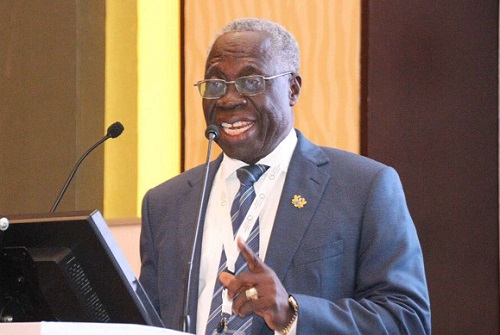The cedi rebounding against the major trading currencies will not reverse any moment soon, after it slumped to a record low of GH₵5.5850, according to the Senior Minister, Mr. Yaw Osafo Maafo, who attributed the wobbly performance to some factors nearing the end of the IMF programme.
But with Ghana successfully exiting the IMF programme that began around 2015, Mr. Osafo Maafo said stability of the local currency is now assured.
He explained that government – nearing the end of the IMF programme – had to meet “seven different prior actions”, some of which were inimical to stabilisation of the local currency, causing it rapidly depreciate in recent times.
However, over the past week the cedi has appreciated strongly against the US dollar – making it the best-performing currency in the over-140 currencies monitored by Bloomberg.
The minister who was speaking at the 6th Annual Conference and exhibition of the Ghana Insurance Brokers Association (GIBA) in Kumasi, urged Ghanaians to look forward to seeing economic improvement, given that government has to take some tough decisions to get the country in shape.
Mr. Osafo Maafo explained the need to bring some changes into the insurance industry, noting that it is necessary to undergo these changes following the reforms which have been introduced in the banking sector
“Once you want to do the economy right and you sanitise the banks, you cannot leave out the insurance industry,” he said.
He commended insurance industry players for leading discussions on the capitalisation ahead of any policy announcement by government on the industry.
He noted that government is aware of some ongoing discussions of the NIC to increase the minimum capital requirement of various players within the insurance industry. “The question is: how far should they go?”
However, he added that government is interested in protecting local companies and will not raise capital to levels which will place the sector in the hands of foreign entities who can afford the money required.
The Senior Minister advised the insurance regulator, the National Insurance Commission (NIC), to consider categorising the insurance companies into tiers, depending on their size and capitalisation, while also challenging the insurance companies to be looking at mergers in order to remain competitive.
The Insurance Commissioner, Mr. Justice Yaw Ofori, explained that the decision to recapitalise the industry and the proposed minimum capital are born from careful analysis of industry statistics and indicators over a period time – which point to operational ineffectiveness among others that lead to overseas premium flights.
“This major issue needs to be remedied to ensure a robust Ghanaian insurance industry.” He acknowledged that the insurance industry is crowded with a number of small, undercapitalised companies whose businesses are usually too low to cover the rather high fixed overhead costs.
“These companies have weak controls and practice poor risk management, resulting in operational losses and liquidity challenges.”
He also noted that rapid depreciation of the local currency has also affected operations of the insurance companies.
Mr. Yaw Ofori, among others, concluded that an upward revision of the minimum capital requirement is therefore expected to help improve effectiveness and increase underwritings and retention capacities of players.
Source: B&FT Online





